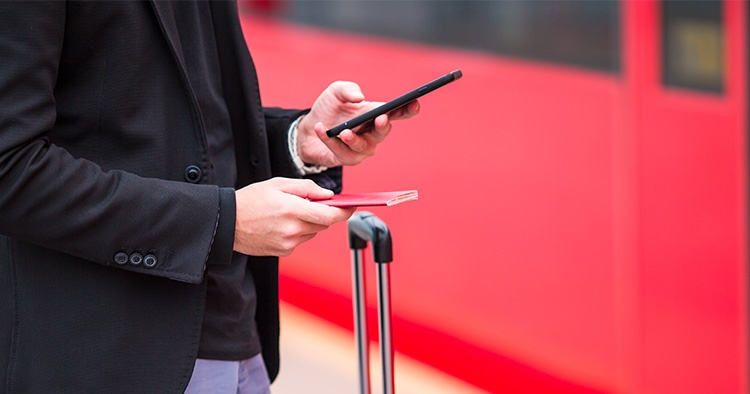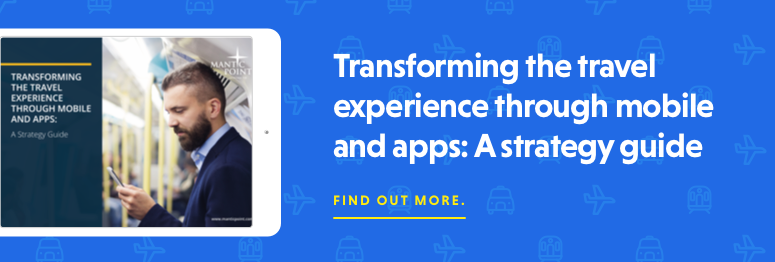Travel Technology Study: 69% of Corporate Travel Programmes Lack a Mobile Strategy
Posted by Mike Atherton on 13 September, 2016

The GBTA foundation, alongside the Carlson Wagonlit Travel (CWT) and the Carlson Family Foundation, recently released a study exploring how travel apps and mobile technology are being integrated into corporate travel progammes. The study uncovered the opinions of travel managers over a wide range of industries. We’ve looked at some of their key findings to measure the impact of travel technology on the corporate travel industry and the challenges and opportunities it creates.
Key findings
- 69% of travel managers say their company does not have a mobile strategy in place.
- Of those that don’t have a mobile strategy, 45% say they plan to implement one within the next two years.
- 78% of business travellers prefer to use self-service technology to manage their business travel, while only 22% would rather use their organisation’s travel progamme.
- Over half of travel managers (54%) have endorsed a mobile travel app in the past year.
Whilst many travel managers see the value of mobile in business travel, with the majority endorsing travel apps, many don’t yet have a mobile strategy in place.
Since the introduction of travel apps back in 2009, travellers' dependency on mobile technology has increased. Just two years later, 60% of mobile users had downloaded and used a travel-related app. With travel apps transforming the user experience, organisations must look towards mobile in order win back the loyalty of their business travellers, who currently prefer the convenience of self-serviced technology over their organisation’s travel progammes.
Opportunities
When asked what opportunities travel managers see in implementing mobile travel strategy, the three most frequently mentioned were:
- Increased traveller engagement (78%)
- Increased compliance (55%)
- Reduced off-progammeme bookings (43%)
With mobile integrated within an organisation’s travel progamme, business travellers will have little reason to book off-progamme, which will in turn increase compliance. The study also stated that adopting a mobile strategy can increase productivity, as travellers have access to functionalities that saves time and increases their overall travel experience. For example, the ability to convert currency, book in-trip merchandising and receive important travel documents within a traveller’s itinerary app speeds up the overall business trip.
Challenges
Implementing a mobile strategy does pose challenges:
- IT security (41%)
- Traveller owns their own device (32%)
- There are too many decision makers (21%)
Most of challenges considered in the survey are interconnected and lead to the biggest challenge of them all: IT security. As businesses integrate mobile technology in general, IT security tends to be the first issue raised. Risk of hacking, data loss and theft, as well as operating within internal policies, may be the reason for an organisation’s slow adoption of mobile. However, as mobiles are becoming a necessity for travellers, organisations should make haste to overcome these challenges as soon as possible – perhaps with the help of travel apps.
How can TMC apps help?
TMC apps primarily serve itinerary management functions, according to travel managers interviewed. What’s interesting is that the travel managers stated that they wish to have booking integrated within their itinerary app. The main reason for this could be to promote policy compliance, by encouraging business travellers to book within the organisation’s travel booking progamme. For example, when discussing hotel bookings, travel managers could achieve higher compliance by giving travellers access to preferred hotels on their itinerary app.
What those travel managers might not know is that such integrated itinerary apps exist. With our merchandising functionality, business travellers can receive offers for hotels, restaurants etc. in real-time and book accordingly. This not only improves compliance but also increases revenue for TMCs.
Also mentioned within the survey was travel risk management software. This is used to keep business travellers safe and constantly connected to their organisation, ensuring duty of care is managed. It’s therefore no surprise that travel managers consider this a priority and huge benefit of implementing a mobile strategy.
It is clear that implementing a mobile strategy is essential for TMCs to maintain business traveller engagement. To ensure your clients stay ahead of the competition, download our travel technology strategy guide for TMCs.


